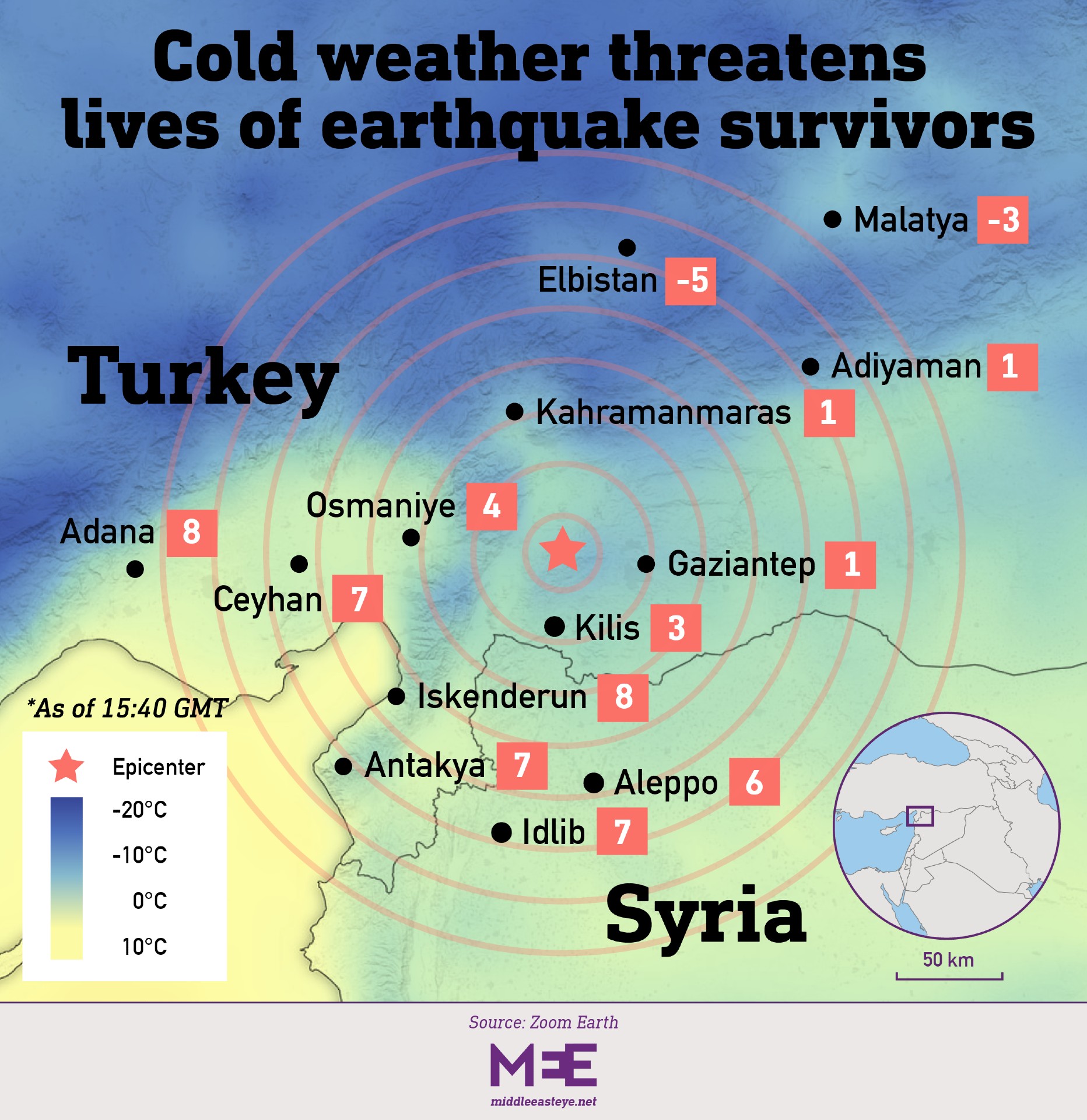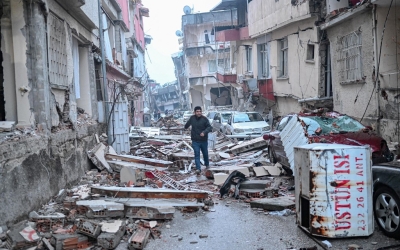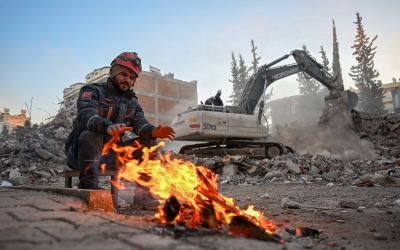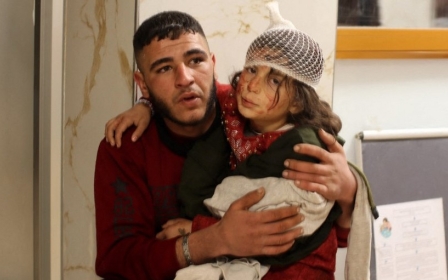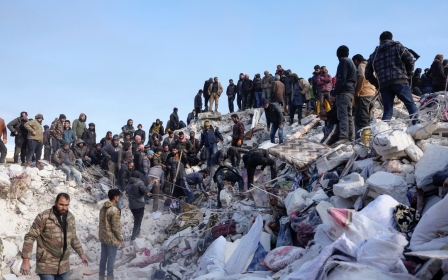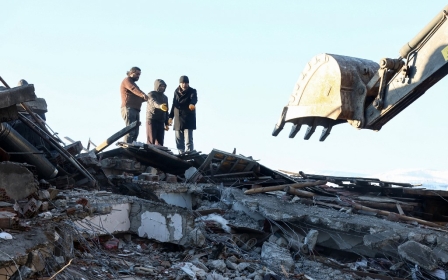Turkey-Syria earthquake: Over 11,000 dead as Erdogan visits disaster-hit region
Rescue efforts continued for a third day across Turkey and Syria following Monday's devastating earthquakes, with the death toll currently at more than 11,000 and expected to rise, as Turkish President Recep Tayyip Erdogan arrived in the epicentre of the quake for the first time.
According to Erdogan, 8,574 are known to have died in 10 provinces across Turkey, while 49,133 people have been injured and over 8,500 rescued.
The Turkish president announced the figure during a visit to Kahramanmaras, one of the regions worst-affected by the quake.
In Syria, the death toll has also climbed to more than 2,530, according to figures compiled from Syria's health ministry and the Syrian Civil Defence group, known as the White Helmets, in the rebel-held northwestern parts of Syria.
New MEE newsletter: Jerusalem Dispatch
Sign up to get the latest insights and analysis on Israel-Palestine, alongside Turkey Unpacked and other MEE newsletters
Criticism has been widespread in both countries at the lack of response from both national governments and the international community.
Erdogan travelled to Kahramanmaras on Wednesday to meet earthquake survivors, according to the Turkish presidency, as anger continues to mount over his government's aid effort.
Turkey's opposition blamed the president for an inadequate emergency response as thousands of people are still believed to be under the rubble in several cities.
Erdogan’s TV appearance on Tuesday, in which he warned that the government would keep the records of people who disseminate disinformation, also angered many people on social media.
Many eyewitnesses, speaking to MEE, have said that the aid efforts particularly in Hatay were insufficient in the first 48 hours of the disaster.
Turkish Health Minister Fahrettin Koca said on Tuesday night that the search and rescue teams have been doubled in the city where nearly 3,000 building have collapsed.
Erdogan is also expected to visit Hatay this week, a Turkish official said.
Call for aid
The US Geological Survey said a 7.8-magnitude quake first struck at 4:17 am (0117 GMT) on Monday at a depth of about 18km near the southeastern Turkish city of Gaziantep.
A second 7.5 magnitude earthquake hit Turkey's Kahramanmaras province shortly after.
The quakes have had a devastating impact across southern Turkey and northern Syria, with opposition-held areas in the latter most affected.
Turkey said almost 3,000 buildings had collapsed in seven different provinces, including a number of public hospital buildings.
Turkey also suspended its stock exchange on Wednesday after a 7 percent fall in the morning.
Stock prices had been in free fall since the earthquake, which is estimated to have caused billions of dollars of losses to the Turkish economy.
Freezing temperatures across the region have also made the need for aid even more vital.
Irem Danalioglu, 29, spoke to Middle East Eye about her volunteering efforts on Tuesday afternoon.
A content management specialist at Turk Telekom International, one of Turkey's leading operators, Danalioglu took the day off work to volunteer in Istanbul's Fatih district.
"Coats, boots, sweaters, socks, electric heaters - things that are urgently needed are collected. Within hours of this centre opening up, thousands came to help," she said.
"Help is being collected and sent to AFAD which is also distributing aid amongst the ten affected regions."
International help
There have been increasing calls for international sanctions on Syria to be lifted and for the opening of more border crossings, after the Bab al-Hawa crossing - the main route for aid to enter the northwest - was reportedly put out of action.
The Bab al-Hawa border crossing is the sole lifeline for millions of people in Syria's northwest, as they live in areas the Syrian government does not control. Normally, more than 1,000 truckloads of aid pass through the crossing each month.
Spokesperson for UN secretary general, Stephane Dujarric, said the crossing was "actually intact" but explained that "the road that is leading to the crossing has been damaged, and that’s temporarily disrupted our ability to fully use it".
More than 40 countries have already pledged support for Turkey and Syria.
The European Union, the UN, Nato, the US, China and Russia all said they would be providing help, while Greece and Sweden appeared to set aside months of simmering tensions to provide aid to Turkey.
However, US Secretary of State Antony Blinken announced on Tuesday that his country would not work with the government of President Bashar al-Assad in Syria.
Assad's government is under Western sanctions over his actions in the country's 12-year civil war.
The WHO said that up to 23 million could be impacted by the fallout from the earthquake.
"Event overview maps show that potentially 23 million people are exposed, including around five million vulnerable populations," WHO senior emergency officer Adelheid Marschang told the UN health agency's executive committee.
Middle East Eye delivers independent and unrivalled coverage and analysis of the Middle East, North Africa and beyond. To learn more about republishing this content and the associated fees, please fill out this form. More about MEE can be found here.


